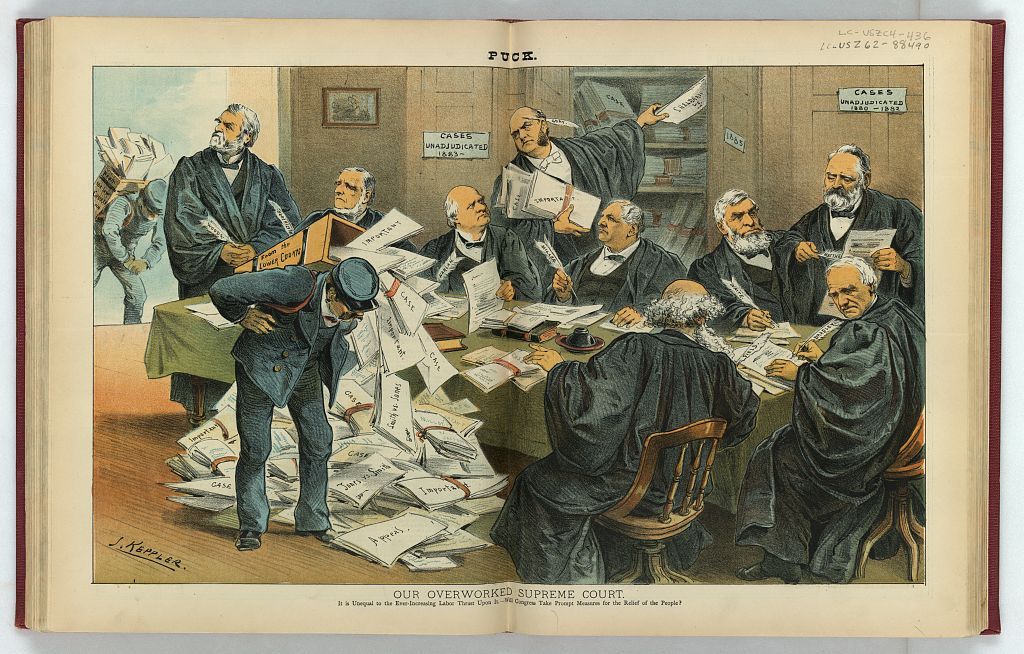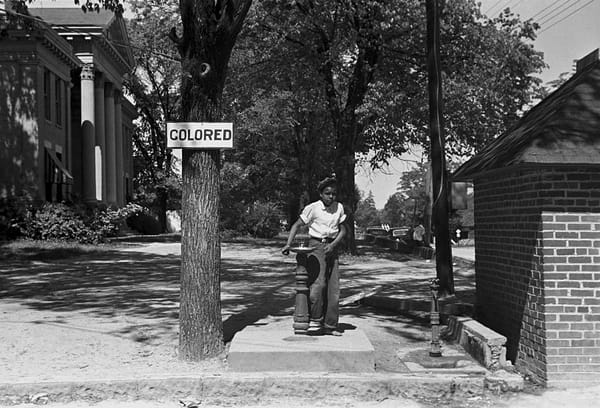I apologize for the misleading title; anybody who’s paying attention knows that Jim Crow hasn’t gone anywhere. If your history class didn’t adequately explain what Jim Crow was, or if you were sleeping, Jim Crow was a series of laws designed to enforce segregation in public places and duplicate enslavement as much as possible under the law. If you were unemployed, you could be sent back to the same plantation where you were once enslaved. Violate curfew, be broke, sass a white man, look at a white woman, be Black; all of the above was sufficient to end one’s freedom. Lastly, the Supreme Court in Plessy v. Ferguson in 1896 said that Black people had no Constitutional rights and that was Jim Crow, the law of the land which lasted until 1965.
It keeps recreating itself under different titles and new management. Long before Jim Crow, there was the enslavement of Black people, then came the Black Codes right after the Civil War, which duplicated enslavement as much as the law allowed. There was the ever-so-brief Reconstruction period, which was only viable due to the presence of federal troops to protect those who’d been enslaved. After twelve short years, Democrats and Republicans conspired to end Reconstruction and ushered in Jim Crow, which has lasted ever since—despite what the history books say.
There are many dates people point to as the supposed end of Jim Crow. Some look at 1948, when President Harry Truman integrated the military. Others cite 1954, when the Supreme Court decided Brown v. Board of Education, which was supposed to integrate public schools. That “With All Deliberate Speed” clause placed no timeframe on integration, and some schools in the South and New York City still meet the definition of segregated schools to this date.
There are two primary areas where Jim Crow's spirit has cropped back up . . . voter suppression and the filibuster in the US Senate.
The commonly recognized date for the end of Jim Crow is when the Civil Rights Act was signed in 1964, followed by the Voting Rights Act of 1965 and the Fair Housing Act of 1968. Jim Crow laws were mostly off of the books. However, if anyone was paying attention, new laws cropped up with the same mission. The Supreme Court that grudgingly gave us Brown v. Board of Education weakened the Civil Rights Act and Voting Rights Act in the same way they weakened or found unconstitutional all such Acts throughout American history.
There are two primary areas where Jim Crow's spirit has cropped back up, concerned only about results and not giving a damn about appearing to be exactly what they are: voter suppression and the filibuster in the US Senate. You might think I’m about to veer off into an attack on one political party. However, in US history both major parties have served as instigators or have been complicit in perpetuating these schemes. Neither voter suppression nor the filibuster could continue to exist without the acceptance of all involved.
Let’s start with voter suppression. When America was formed, the only people allowed to vote were land-owning white males. Black men born in the US officially got the right to vote with the Fifteenth Amendment’s ratification in 1870. Women got the right with ratification of the Nineteenth Amendment in 1920. Unsurprisingly, the year women were able to vote also saw the biggest surge of violence in decades against Black citizens trying to vote. As part of a statewide conspiracy to prevent Black people from voting, the Black population of Ocoee, Florida, was either killed or burned out in response to two Black men who attempted to vote.
![The fifteenth amendment. Print showing President Grant sitting at the center of a large table, with several men clustered around, signing the 15th amendment granting that the right to vote cannot be denied on basis of race or color. From left, sitting and standing, are "E. Stanton, H. Greley [i.e., Greeley], S. Colfax, A. Lincoln, R. Small[s], U.S. Grant, Chs. Sumner, W.F. Seward, Lt. Gov. Revels, Fred. Douglass, B.J. [i.e., F.] Butler, [and] W.T. Sherman." Vignettes along sides and bottom show African Americans in military service, at school, on the farm, and voting. A head-and-shoulders portrait of John Brown is hanging on the wall in the background.](https://www.ohfweekly.org/content/images/2021/03/service-pnp-pga-03400-03453v.jpg)
The Black vote has been suppressed in America by violence or legal means ever since Black people first got the right. Even in 2021, little has changed—merely the methods by which suppression is accomplished.
As I write this, over 250 pieces of legislation are being considered in forty-three states to suppress votes. Georgia has already passed its bill, which began as two pages and turned into a ninety-five-page opus banning such things as handing out water and food to those waiting in line for hours to vote. It would be easy to blame one political party for the current emphasis on voter suppression, but the other has a similar past and is currently complacent and therefore complicit. American history is replete with examples of major political parties conspiring to enrich themselves at the expense of People of Color (POC). The same POC are not allowed to fully utilize the right to vote because of the barriers put up to impede them.
What makes all this similar to Jim Crow—no, exactly like Jim Crow—is the blatant audacity shown when carrying out these deeds. It was the attempt to throw out votes in the last presidential election, based on location. In states where there were close elections, they wanted to discard votes in urban areas to change the results. Where they suggested those votes were fraudulent, with no proof. What they were really saying is that those voters are fraudulent, as originally intended in America, with an attempt to make it so again, ever since.
In addition to voter suppression, one of the chambers of Congress that is supposed to protect people's rights devised a mechanism to prevent them from doing so. The filibuster is a provision in the rules, found nowhere in the Constitution, that allows a minority of Senators to hold not only the body but the country hostage regarding legislation they dislike. They argue the filibuster wasn’t first used in a racist manner and wasn’t designed to support Jim Crow. Yes, the very first time it was used it may have been for a different purpose, but it found its niche: finding a way to do the white thing, rather than the right thing. By the time of Jim Crow, it had been perfected to prevent meaningful racial change.
“It’s been a tool used overwhelmingly by racists.”
—Kevin Kruse, Professor of History with a focus on race and American politics at Princeton University
Originally introduced in 1805 by Vice President Aaron Burr, the filibuster was supposed to be a way to hasten Senate proceedings. In 1917, a reform was made to prevent an individual senator from hoarding the floor. Still, it allowed for the prevention of a vote to end discussion unless then sixty-six—and now sixty—senators voted to end a debate. Later it was decided a senator didn’t need to rise and speak to hold the floor; he or she (she has never happened) can send an email to their leader, to anonymously invoke the filibuster.
Researchers Sarah Binder and Steven Smith identified every bill passed by the House of Representatives that failed in the Senate between 1917 and 1994 due to the filibuster. Half of those were civil rights bills, including two in 1922 and 1935, designed to prevent lynching. Who can be against lynching? The body that until 1935 had only elected one white female senator (Hattie Carraway-AR) while another white female (Rebecca Latimer Felton-GA) served for twenty-four hours in 1922. Otherwise, the body that supported lynchings and derailed civil and voting rights had been composed of white men, mostly rich and landowning, just as the founders originally intended.
The filibuster, voter suppression, and opposition to civil rights have always gone hand-in-hand. When Senator Strom Thurmond of South Carolina famously held his filibuster in 1957 for twenty-four hours and eighteen minutes, he was relieved by other senators to use the bathroom and was brought orange juice, diced pumpernickel, and bits of cooked hamburger to eat. He was fortunate he was on the floor of the Senate and not in a long line in Georgia, where bringing him food and drink was just made illegal.
In 1891, the filibuster was used to block a voting rights bill. As recently as 2020, Senator Rand Paul of Kentucky used the filibuster to attempt blocking an updated anti-lynching bill. One would reasonably ask, why do we still need anti-lynching bills in the present? Then we remember all the Black names we’ve been repeating lately and understand why.

Ever since we’ve had a two-party system, it’s taken the combined effort of both parties to continue allowing voter suppression, often using the filibuster to make it so. It’s also important to note that the fail-safe of the courts, which has often been used to stop the most blatantly racist maneuvers, can no longer be guaranteed. For decades, the Federal courts and, to a degree the Supreme Court, have been packed with mostly white men chosen based on their ideology rather than their knowledge and understanding of the law. The newly enacted Georgia laws have already been challenged and will soon have their day in court. Just like the days of Jim Crow, senators brazenly voted to approve unqualified nominees to lifetime appointments to the bench.
At this precise moment in time, voter suppression and the filibuster have reached the forefront of America’s political consciousness as all the bills to restrict the rights of minorities to vote are plowing ahead. The John Lewis Voting Rights Advancement Act has passed the House of Representatives and is ready to be taken up by the Senate. The bill would restore that which was taken away from the 1965 Voting Rights Act by the Supreme Court in 2013. Like the aforementioned anti-lynching bills, who could be against voting rights? You likely already know the answer. The other question is, who would be complicit in enabling those senators to block the voting rights of minorities in America? The answer would be all those who allow the filibuster's continued existence when they could do away with it with a majority vote.
When it comes to the filibuster, one is either with lynching and voter suppression or against them. If the means exist to do away with them legally but you don’t, your actions or lack thereof indicate which path you choose. It’s not just the hundred members of the United States Senate that must choose; it’s the voters in the fifty states who put them in office, often returning them to office, knowing full well who they are. Strom Thurmond surprised nobody when he stood up against civil rights. It’s who he was before and during his forty-eight years as a senator, and earlier as the Governor of South Carolina. He was anti-civil rights, pro-lynching, and pro-voter suppression during all his years of service.
“I wanna tell you, ladies and gentlemen, that there’s not enough troops in the army to force the Southern people to break down segregation and admit the Nigra race into our theaters, into our swimming pools, into our homes, and into our churches.”
—Senator Strom Thurmond
It’s not only the Senate that needs to stand against voter suppression and the policy that allows it to exist. The American people need to take a stand as well. Politicians recognize that they are doing the will of enough of the people that supporting racist measures will likely result in their reelection. Until the rest of the people stand up and turn them out of office, there will be no change. It’s time, right now, to show support for the John Lewis Voting Rights Advancement Act and demand your senator does the same.
Top photo by Francis Enterprises, LLC





